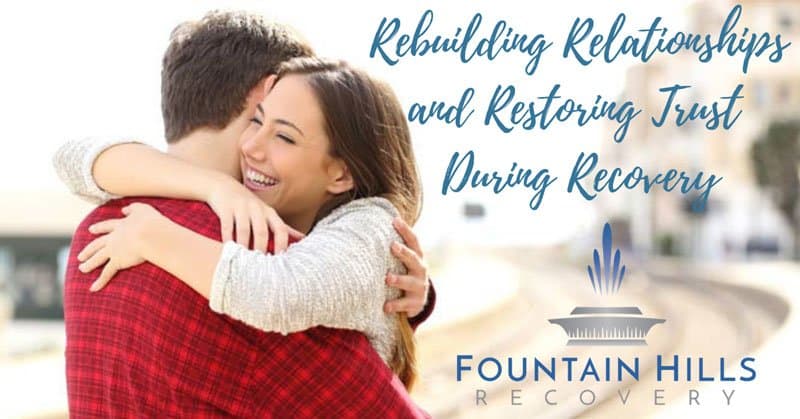When addiction takes hold, it affects almost every part of a person—their health, their social lives, their jobs, and most importantly, their relationships. Addiction affects more than the person struggling to stop abusing drugs or alcohol. The effects of a person’s addiction manifest in the relationships with their spouses, children, extended family members, and friends. Loved ones find it difficult to trust again after feeling betrayed, especially when their trust was repeatedly broken.
The loss or weakening of important relationships is arguably some of the most palpable losses for people in recovery. Damaged relationships can be difficult to repair, even under the best of circumstances. In many cases, the damage may not be reparable if the loved one isn’t willing to work on it. This is a tough situation for recovering addicts to accept.
It’s possible to repair trust issues when both parties are willing to try. Just as we learn to trust someone for the first time, people can learn how to trust again while someone recovers from addiction. Taking those steps towards rebuilding trust with loved ones is an important step in the recovery process.
Rebuilding Relationships Takes Time
When a relationship gets hurt or damaged, we have a tendency to want to scramble to fix it. That’s because relationships are important to us. Fixing things makes us feel better. In the haste to try to make amends after hurting someone or betraying their trust, people in recovery often forget how long it took to form that important relationship in the first place.
Relationships don’t happen overnight. They take time to cultivate. Sharing experiences over time strengthens relational bonds. It takes years and years to develop strong bonds and healthy relationships. Rebuilding trusting relationships can be painful and difficult. Remember that it took time and patience to develop relationships; and that it will take time and patience to heal them.
There’s bound to be hills and valleys along the journey, but don’t give up hope!
Rebuilding Trust Begins with You!
Just as breaking down the cornerstone of relationships began with you, rebuilding new foundations with family and friends, also begins with you. Just as it’s difficult to allow yourself to be vulnerable during the treatment process, your family and friends must also allow themselves to be vulnerable to accepting the new and improved, addiction-free you.
To get to a place where others can truly trust you again, you need to demonstrate over and over again that they can trust you. They’ll probably be skeptical, especially in the beginning. When you are consistent, others will eventually see the fruits of your labor as it plays out in your life. Demonstrate that people can trust you in the small things, as well as the bigger things. Try to look past any initial criticisms, and just keep working your treatment plan.
Recovery is a time for reconnecting with yourself. Undoubtedly, addiction has changed the fiber of who you are. As you begin to make progress towards your goals to be substance abuse-free, the more you will be able to trust yourself. If you can trust yourself, others can trust you too.
Being vulnerable won’t be easy for either of you. Remember to take rebuilding the relationship slowly and don’t expect great things in the beginning. And know that you won’t have to do it alone.
Reforming Relationships Is Part of Creating and Maintaining a New Life Structure
Addiction tests the strength of the bonds you have with others that you care about, but it doesn’t have to break the bonds that you’ve already formed. It may mean that you have to reform those bonds. When you do, you will rebuild them with a fortitude that didn’t exist prior to your addiction.
Your treatment team will teach you how to rebuild new life skills to keep you free from addiction. Much of the plan for treatment consists of helping you to build some type of structure and accountability into your life. Structure helps you create healthy boundaries so that you won’t fall victim to a trigger that leads you back to abusing substances. Recovery programs also help you build some type of accountability into your new life. Structure and accountability are also components of relationships that are good, healthy, and supportive.
You’ll gain new life skills as you participate in a treatment plan. Developing your relationship skills is part of what provides you with immediate and long-term support.
Professional Counselors Can Help! You Don’t Have to Do It Alone
Repairing relationships in addition to tackling an addiction can feel overwhelming, especially in the beginning. Professional counselors like those at Fountain Hills Recovery listen to your situation carefully, and develop a plan to help you earn back the trust that your addiction took from you. It can be a daunting process, but your counselors will set up a program that will hep you to get the proper support and have lasting success.

Some Final Thoughts About Repairing and Restoring Relationships
Learning how to have healthy relationships is a work in progress for most people, even people without addiction challenges. It usually takes working at them from both sides. Everyone needs to hone their skills for building healthy relationships to some degree. Working at building relationships builds social skills that last a lifetime.
Addiction inhibits the trust that is vital to healthy relationships. Restoring relationships is difficult and takes time. Recovery from addiction is also difficult and takes time. Most things in life that challenge us to work at them over long periods of time have much greater rewards on the other end. With the help of structure, accountability, and persistence, your efforts can lead to relationships that are longer, healthier, and more meaningful.
Rebuilding relationships during recovery centers around the issue of trust. Having success in relationships proves to others that they can trust you. In turn, improved relationships validate that you are worthy of trust. Just as you have to trust in the process of recovering from addiction, to have better, healthier relationships during recovery, you have to trust in the process of rebuilding relationships.
Begin rebuilding that trust and restoring your relationships, contact us today at 888.549.4037 to get started.




